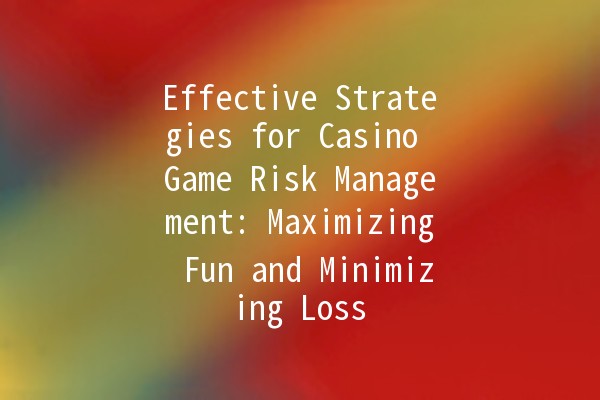In the enchanting world of casino games, the thrill of winning often walks hand in hand with the risk of losing. For both casual players and seasoned gamblers, understanding the intricacies of risk management is essential in ensuring a sustainable and enjoyable gaming experience. This article delves into effective strategies for managing risk while engaging in various casino games, from table games to online slots. We will cover practical tips, actionable advice, and realworld examples to help players enjoy their gambling experience responsibly.
Understanding Casino Game Risk Management
Casino game risk management involves identifying, assessing, and mitigating risks associated with gambling activities. The ultimate goal is to optimize the enjoyment of games while minimizing potential financial losses. This requires a combination of strategic planning, selfdiscipline, and knowledge of various casino games.

One of the fundamental aspects of effective risk management in casino gaming is setting a budget. Players should clearly define how much money they can afford to lose before they even start playing.
Example: A player decides on a monthly entertainment budget of $
Actionable Tip: Keep your budget in cash or on a separate prepaid card dedicated to gaming. This physical separation can help deter overspending.
Different games come with varying levels of risk, and understanding these differences is crucial for effective risk management. Table games typically have a house edge, but some games offer better odds than others.
Example: Blackjack is known for its relatively low house edge (around 1%) when played optimally, while slot machines can have a house edge that surpasses 10%. A player looking to manage risk might prefer blackjack over slots.
Actionable Tip: Research games before playing. Use resources that outline the odds and house edges to choose games that suit your risk appetite.
Bet sizing is both an art and a science in risk management. Players must determine the size of their bets in relation to their bankroll and the level of risk they are willing to assume.
Example: A player with a $500 bankroll may opt to wager no more than 5% of their bankroll on any single bet. This approach means the maximum wager would be $
Actionable Tip: Adjust your bet sizes according to your winnings or losses during a session. If you find yourself on a winning streak, consider increasing your bet size cautiously, but always have a cap.
A win/loss limit is another effective strategy for risk management. Setting limits on how much to win or lose before stepping away from the table can prevent emotional decisionmaking.
Example: A player sets a rule: if they double their bankroll, they will cash out and take a break. Conversely, if they lose 25% of their initial bankroll, they will stop playing for the day.
Actionable Tip: Write down your win and loss limits before starting to play. This commitment creates a level of accountability and makes it easier to stick to your plan.
Layered play involves combining different gambling strategies across games to spread risk more effectively. For instance, a player may engage in both higherstakes games with a small portion of their bankroll while using a conservative approach in lowerstakes games.
Example: A player might decide to allocate 40% of their bankroll to conservative poker tables where they can use skill to improve their chances while risking 10% of their bankroll on higherrisk games like roulette.
Actionable Tip: Diversify your gaming portfolio. By playing different types of games with varying risk levels, you can find a balance and potentially mitigate losses from your more risky wagers.
Frequently Asked Questions
Bankroll management is vital for longterm success in casino gaming. It ensures that players do not exceed their financial limits and helps maintain the enjoyment of the game. Without proper management, players risk depleting their funds quickly, leading to negative experiences.
If you've reach your budget limit, it's essential to adhere to that limit. Take a break from gaming, and consider engaging in other activities or hobbies until the next gaming session. Returning refreshed can help maintain a positive outlook toward your gaming habits.
No, casino games are designed to give the house an advantage. While strategy can enhance your chances in certain games (like poker or blackjack), the outcomes in games of chance, like slots or roulette, are random. Therefore, focusing on risk management is key to optimizing your experience.
The house edge is the statistical advantage that a casino has over players in any game. Understanding the house edge allows players to make informed decisions about which games to play, helping them manage their risk levels more effectively.
Emotions can heavily influence gambling decisions, often leading to impulsive actions. Understanding your emotional triggers and imposing limits can help mitigate the impact of emotions on your gameplay and help you make more rational decisions.
While luck plays a significant role in casino games, employing effective risk management strategies and playing games with better odds can enhance your overall chances. Additionally, continual learning about game strategies and banking management will serve you well.
: Embrace Responsible Gaming
Engaging in casino gaming should always prioritize fun and entertainment. By understanding and applying effective risk management strategies, players can enjoy their experiences while minimizing financial exposure. Setting budgets, selecting appropriate games, and employing strategic betting tactics are all essential components for a responsible gambling practice. Ultimately, the goal is to create a balance between enjoyment and financial responsibility that leads to a fulfilling experience at the casino.